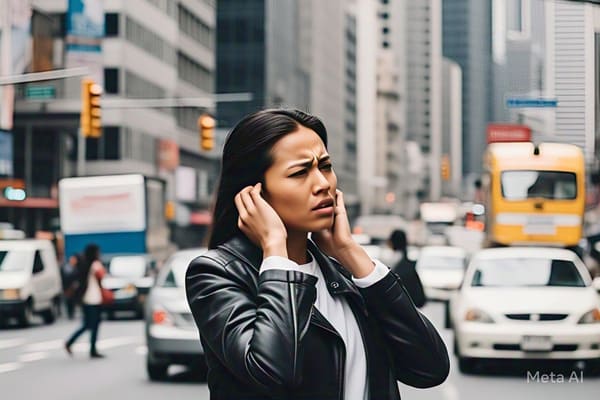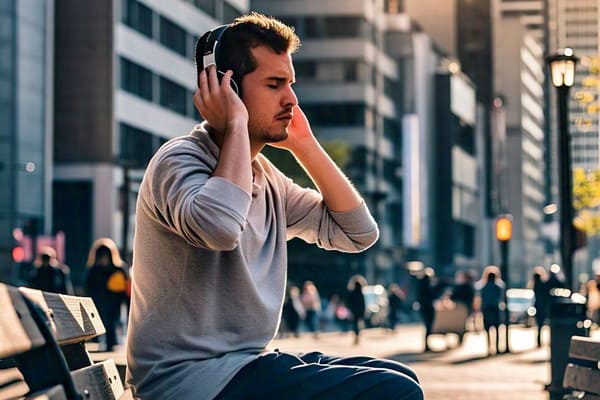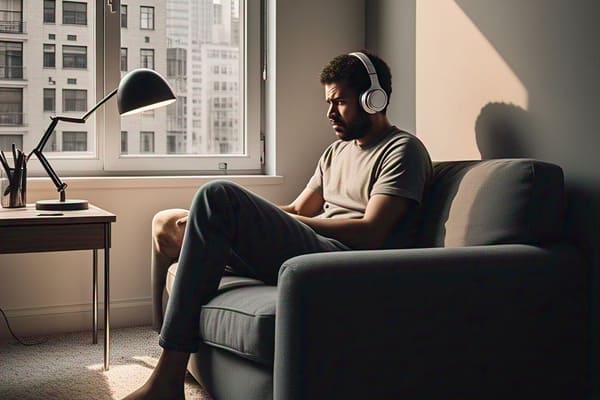If you’ve ever felt overwhelmed by the noise in a busy café, an open office, or a crowded subway, you’re not alone. Studies suggest that constant exposure to noise pollution can increase stress hormones like cortisol, making it harder to focus, relax, or even sleep. For individuals with anxiety or sensory sensitivities, everyday sounds can feel unbearable. But what if there was a way to tune out the chaos and create a personal oasis of calm? Enter noise-canceling headphones.
With the ability to reduce unwanted background noise, these devices are more than just a luxury for audiophiles—they’re a game-changer for mental well-being. But do noise-canceling headphones help with anxiety? Research and countless testimonials suggest that they do. Let’s explore how they work, their benefits, and what to consider when choosing the best noise-canceling headphones for anxiety relief.

How Noise Pollution Affects Mental Health
Chronic exposure to noise—whether from traffic, construction, or even open-office chatter—has been linked to increased stress and anxiety. According to a 2023 study published in the Journal of Environmental Psychology, prolonged exposure to high noise levels can elevate cortisol, the body’s primary stress hormone, leading to heightened anxiety and irritability.
For those with generalized anxiety disorder (GAD), sensory processing sensitivities, or autism spectrum disorders, background noise can feel overwhelming, making it difficult to focus or stay calm in public spaces. By reducing noise exposure, noise-canceling headphones create a controlled auditory environment, helping users feel more grounded and at ease.
The Science Behind Noise-Canceling Headphones
Noise-canceling headphones use Active Noise Cancellation (ANC) technology, which detects external noise through built-in microphones and generates sound waves that counteract the noise. This process, called destructive interference, significantly reduces environmental distractions, allowing the brain to focus or relax without competing sounds.
There are two types of noise cancellation:
- Passive Noise Cancellation: Uses physical barriers like padded ear cups to block out noise.
- Active Noise Cancellation (ANC): Uses electronic processing to cancel sound waves before they reach your ears.
Studies have shown that reducing auditory distractions can lead to lower stress levels, improved concentration, and better sleep—key factors in managing anxiety.
Benefits of Noise-Canceling Headphones for Anxiety
1. Enhanced Focus and Productivity
Whether you’re working from home, studying in a library, or trying to concentrate in a busy office, background noise can be a major distraction. A study from the University of California, Irvine found that office workers exposed to unpredictable noise interruptions experienced up to a 66% drop in productivity. Noise-canceling headphones help create a distraction-free environment, allowing for deeper focus and mental clarity.
2. Reduced Sensory Overload in Public Spaces
For people who experience anxiety in noisy environments, such as airports, malls, or public transport, noise-canceling headphones offer a sense of control. Instead of being bombarded by unpredictable sounds, users can listen to calming music, white noise, or simply enjoy silence, helping them navigate crowded spaces with less stress.

3. Improved Sleep Quality
Anxiety often leads to difficulty sleeping, and external noise can make matters worse. Whether it’s the sound of traffic, a snoring partner, or noisy neighbors, disruptions can prevent deep, restorative sleep. Using noise-canceling headphones to block out distractions has been shown to improve sleep efficiency and reduce nighttime awakenings, leading to better overall mental health.
4. A Calmer Travel Experience
Airplane engines, train announcements, and loud conversations can make travel stressful for people prone to anxiety. Noise-canceling headphones help reduce these auditory stressors, making long flights or commutes more peaceful. According to a 2022 survey by Bose, 76% of travelers reported feeling significantly less stressed while using ANC headphones on flights.
Best Situations to Use Noise-Canceling Headphones
- Public transport & commuting – Trains, buses, and flights.
- Workplaces & study sessions – Open office distractions and exam preparations.
- Cafés & public spaces – Managing sensory overload in social settings.
- At home – Creating a stress-free environment for relaxation and sleep.
Choosing the Best Noise-Canceling Headphones for Anxiety
When selecting the best noise-canceling headphones for anxiety relief, consider the following factors:
- Active Noise Cancellation (ANC) Level: Some models offer adjustable ANC, allowing users to control how much noise is blocked out.
- Comfort & Fit: Lightweight, cushioned headphones prevent discomfort during long wear.
- Battery Life: Look for models that last at least 20+ hours per charge.
- Sound Quality: A good balance between noise cancellation and clear audio playback is key.
- Price & Brand Reputation: Top-rated models include Bose QuietComfort, Sony WH-1000XM5, and Apple AirPods Max, known for their industry-leading ANC features.

Common Myths About Noise-Canceling Headphones
- “They block all sounds” – Reality: They reduce but don’t eliminate all noise.
- “Only for music lovers” – Reality: Also beneficial for stress, focus, and relaxation.
- “Expensive means better” – Reality: Some affordable options perform well for anxiety.
Potential Side Effects of Headphones on Brain Health
While noise-canceling headphones offer significant benefits for anxiety, prolonged use may come with some concerns. Research indicates that excessive headphone use at high volumes can lead to hearing loss, auditory fatigue, and reduced sound sensitivity over time. Additionally, wearing ANC headphones for extended periods may cause mild ear pressure or discomfort for some users.
To minimize risks, it’s important to:
- Use moderate volume levels (below 85 dB) to protect hearing.
- Take regular breaks to prevent auditory fatigue.
- Choose breathable, cushioned headphones to avoid discomfort.
Noise-Canceling Headphones can be Beneficial for Anxiety
For those struggling with anxiety in noisy environments, noise-canceling headphones offer a simple yet powerful tool to regain control. Whether it’s for better focus, improved sleep, or reduced stress in public spaces, ANC technology can make a meaningful difference. While it’s essential to be mindful of potential side effects of headphones on brain health, using them responsibly can unlock a calmer, more peaceful daily experience.
If noise-related stress has been affecting your mental well-being, investing in the noise-canceling headphones for anxiety could be a game-changer. Your mind—and your ears—deserve some peace.




